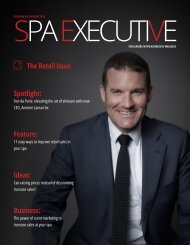Create successful ePaper yourself
Turn your PDF publications into a flip-book with our unique Google optimized e-Paper software.
TRENT MUNDAY<br />
The <strong>Spa</strong> of Tomorrow and why spas don’t have to do “wellness”<br />
Trent Munday is the Senior Vice President of<br />
Mandara <strong>Spa</strong>. He has an eclectic resume of<br />
professional experience, which includes a<br />
year playing American football (in Australia)<br />
and a stint as a bellman in a 4-star<br />
Melbourne hotel, before moving up and out of<br />
the ranks to become the Program Manager<br />
for Accommodation Services for the Sydney<br />
Olympic Village (for the 2000 Sydney<br />
Olympics). After that he moved on to open<br />
resorts for Six Senses, and then COMO<br />
before ultimately joining Mandara <strong>Spa</strong>, where<br />
he still finds himself nearly 15 years later.<br />
A refreshing personality in the spa and<br />
wellness industry, those who follow Munday<br />
know that he always has something to say –<br />
or a question to ask – on his website and<br />
social media accounts. He offers equal parts<br />
insight and unfettered criticism, most of<br />
which is geared towards helping hotel spa<br />
owners and managers improve business<br />
operations.<br />
One of his most common themes is the “<strong>Spa</strong><br />
of Tomorrow” – what does the future of the<br />
industry look like, and how will things<br />
change? He has also mercilessly tackled the<br />
notion that “spa” and “wellness” must go<br />
hand in hand, arguing that they actually don’t.<br />
We spoke with Munday about some of his<br />
pet topics, and asked him to elaborate.<br />
Here’s what he had to say.<br />
The global older population is growing<br />
dramatically. Can you please share your<br />
thoughts on how the world’s aging<br />
population will affect the spa industry in<br />
a few years?<br />
I believe there is a massive role for spas to<br />
play in an aging world. I expect that we will<br />
see a significant increase in aged care homes<br />
and communities. Even in Asia, where<br />
traditionally the elderly have been cared for<br />
within the family unit and family home, I see<br />
this happening more and more. Whether we<br />
think about spas as we know them today, or<br />
in a different iteration, the concept of spas in<br />
aged care homes and communities, to me, is<br />
a no-brainer. Beyond just the physical<br />
benefits of a massage, for example, there’s<br />
also the more emotional, deeper benefits of<br />
being cared for. In my experience that is<br />
something that many of the folks in these<br />
aged care facilities long for.<br />
Can you speak a bit about your opinion<br />
that spas don’t have to do “wellness”<br />
and why not? And what this means?<br />
Wellness is a concept the spa industry has<br />
latched onto as our latest shiny new thing<br />
(and more recently, CBD), We say, “Of course<br />
spa and wellness go together. Who else<br />
should be in charge of Wellness? It must be<br />
us.” And that’s fine. But as more and more<br />
people are starting to become aware of it,<br />
wellness shouldn’t just live in the spa. For a<br />
hotel to have solid wellness offerings,<br />
wellness needs to be instilled in food &<br />
Spotlight<br />
<strong>Spa</strong> <strong>Executive</strong> | 16


















